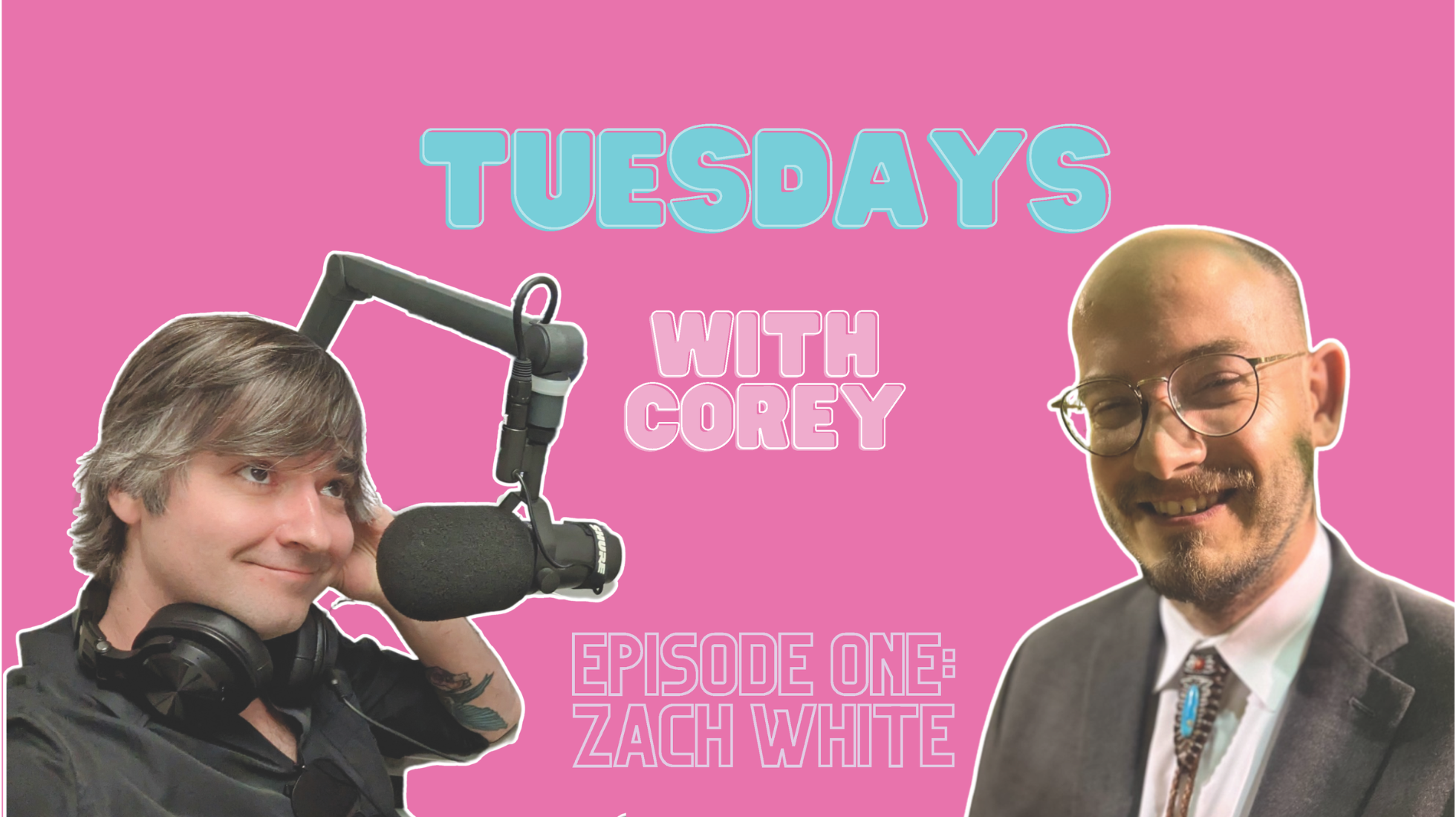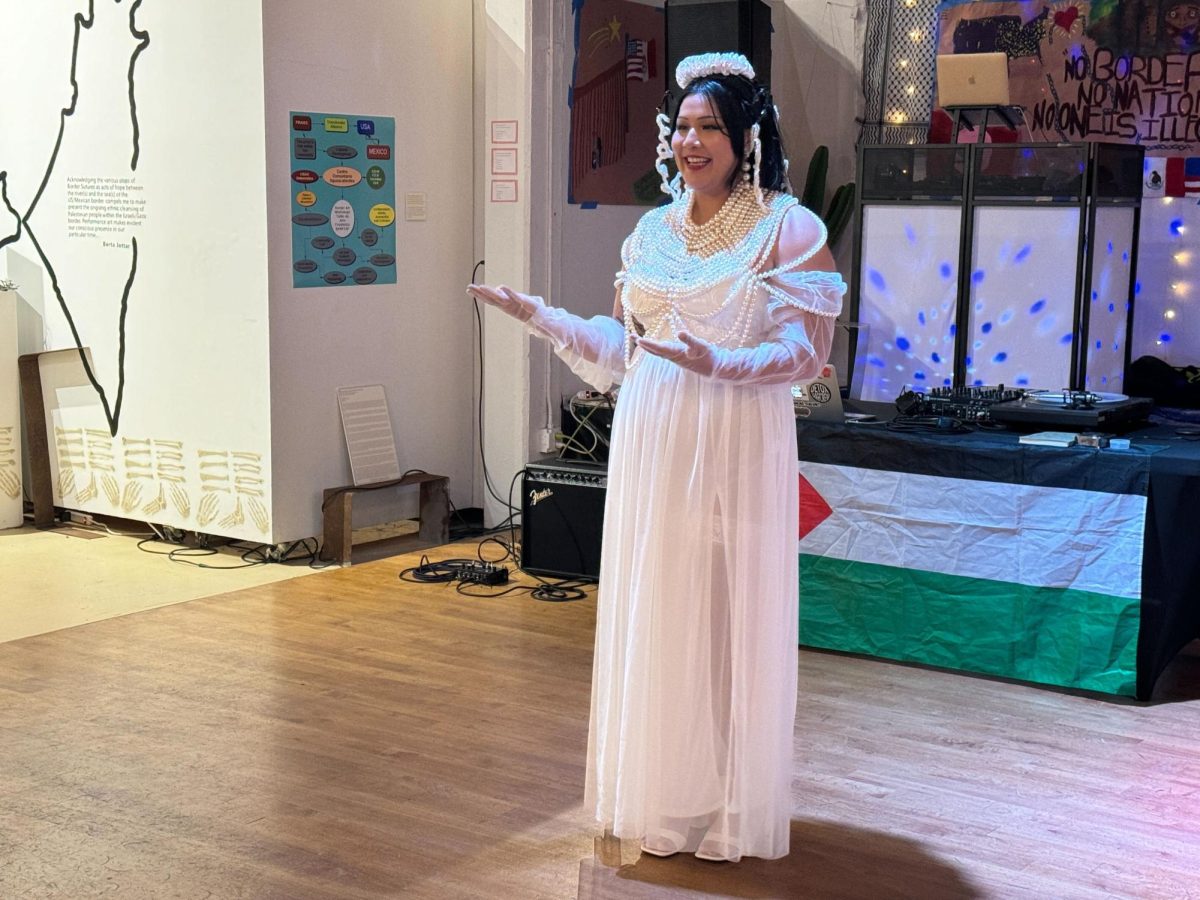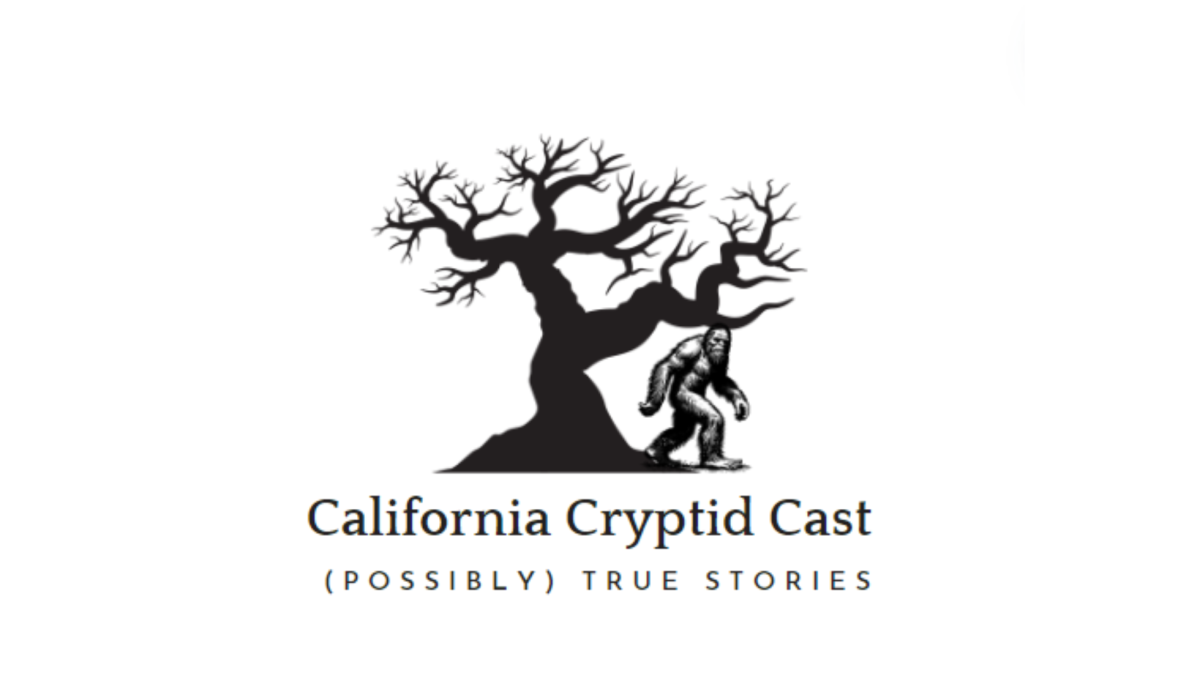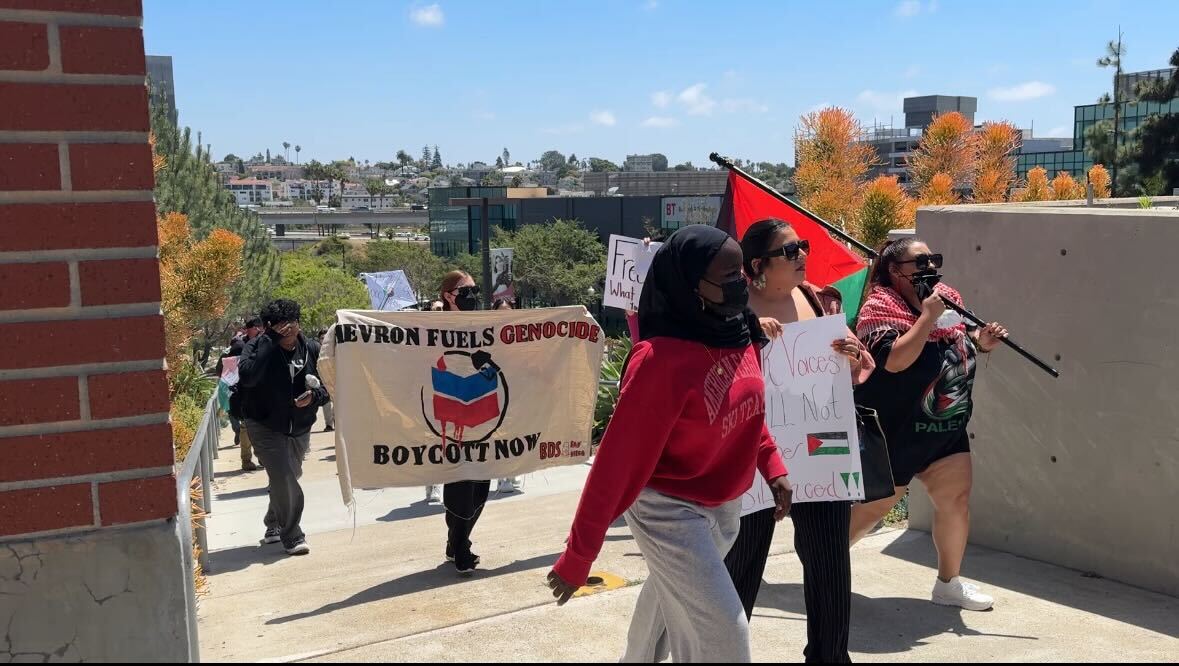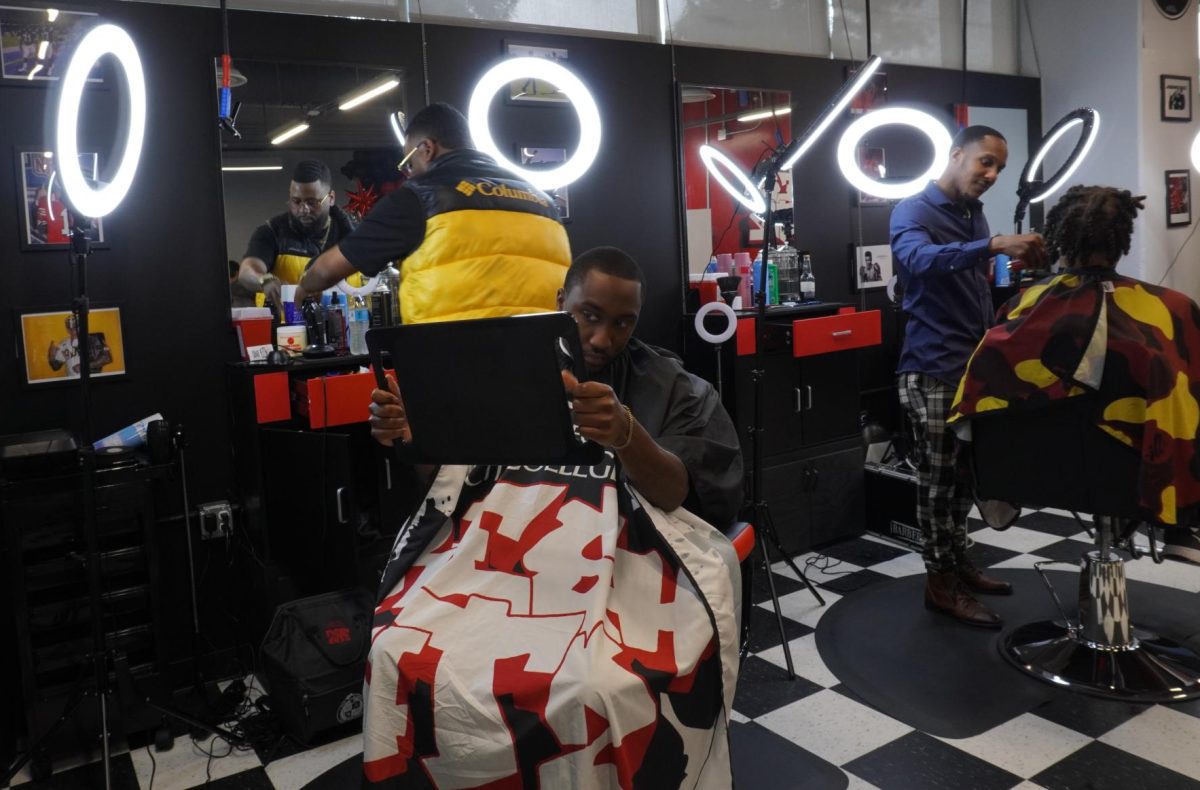Get real experiences and commentary from Corey and his guests in “Tuesdays with Corey.”
Episode 1 of this podcast features Zach White from Adult Swim discussing his life in the media realm.
The show guides listeners in learning from another person’s history, which helps improve our future.
“Tuesdays With Corey” is produced by Corey C. Kopplin (@gorystoryallegory) of City Times Sound.
CT Sound is part of City Times Media, award-winning, student-produced digital news, TV news, magazine, radio/podcast and indie film, all on one platform at San Diego City College. CTM offers hands-on experience for students using new and emerging technologies in state-of-the-art facilities.
Can’t access the recording? Click here. Keep reading for the transcript or click here.
TRANSCRIPT
Corey Kopplin 0:17
Hello and welcome. This is Tuesdays with Corey, I’m your host Corey Kopplin. We’ll be starting off with the frickin wonderful Zach White. Zach has been a production assistant manager and just all around awesome guy for Adult Swim for over a decade now working on some of your favorite shows. There’s just too too many to list them all. So let’s just get in meet the wonderful Zack White!
Zach White 0:54
How you doing?
Corey Kopplin 0:55
I’m doing great. Thank you so much for taking the time. I appreciate it. Welcome to San Diego.
Zach White 1:02
No problem. Yeah, I think I’ll be out there this year for Comicon. For work. It will be more, you know, in the years past Williams Street Swap Shop like, yeah, to do a show. But this time, it’d be more just my regular job.
Corey Kopplin 1:17
You’d hit up La Jolla and everything. Yeah,
Zach White 1:21
Beautiful.
Corey Kopplin 1:21
Once again, thank you for taking the time. This is mostly just talking about what got you into production, likes and dislikes and what you think about the future like, like, Let’s go presently versus when you were coming up kind of thing?
Zach White 1:40
Sure, like in just TV production, or just in general, I guess.
Corey Kopplin 1:44
Any media you want to talk about? I know. Okay, great amount. Yeah. With the television and movies.
Zach White 1:52
Yeah. Um, so it kind of started, kind of probably from like most people when I was a young person, I had access to like a camcorder and made little short films and videos and things like that. I never thought it would ever be a career because I grew up in the Midwest and St. Louis. So I thought it would just be fun to do with friends and then kind of move on from that. But as you get older, you start to realize I need to find something I want to do. And I don’t necessarily want to like work, kind of how everyone in my family did like manual labor, or not so much manual labor, but just kind of boring. And I don’t mean to knock that just that was just what it was like, I don’t want to do that forever. So yeah, I I got, I guess have to go to college. That was sort of what was pitched to do. And then luckily, after I graduated, there’s a program that Turner Broadcasting at the time, TBS, which is now Warner Brothers discovery part of that family. We’re still Turner Broadcasting networks, but Cartoon Network, specifically how to position called a T three. It’s like a production assistant for recent college graduates. So it gives you the opportunity to work in production. I always wanted to do more live action. I actually made a documentary when I was in college that we did pretty well and we got distribution for it. So I thought, maybe that’d be kind of a path to follow. And I still kind of do that on my free time now. Like, it’s a passion that is kind of reignited. Yeah, dignity since layoffs and things. Yeah, yeah. Wow. Okay. So yeah, I did that. And then I’m actually working on another one right now. So all my free time. But so yeah, I came here and I didn’t think animation, but I remember thinking like, having for interviews, I finally got the job. I remember thinking like the week, maybe three days before I actually had to be at work. I was so exhilarated by the process, I thought actually, finally it caught up to me like, What am I going to be doing? Like I don’t, I don’t really know. So the first few days, few weeks months, took kind of a an exciting turn because I you know, I never realized what it took behind the scenes, because you’re so used to doing everything yourself when you’re making your own things. So there’s departments that handle like a lot of administrative tasks. And that’s what production kind of is, is a lot of administrative just making sure securing the location, scheduling the interview, like you did here, getting the Zoom link, just making sure everything’s going smooth or as smooth as it can go. So I just did that. And then streaming Swap Shop started. And we started doing that because we had the opportunity to and we we both wanted to do more creative stuff outside of our regular jobs. So Matt and I wanted to do more creative things. And Matt was doing creative stuff with the bumps, the black and white textbooks, but oh yeah, I had a thirst to kind of go back to my roots, making those short videos of camera camera and my parents camera and just have fun with it. So I did that. And that’s sort of how I got into production. Yeah, I mean, I’m still in production now. Yeah. Wild time. of the industry transitioning from Warner Brothers, you know, immediate Warner media to Warner Brothers discovery who has kind of been a not painful, but just it is what it is. I’m sure you’ve seen in the news. Yeah, blues, tax write offs for films that no one will ever see that I know people pour a lot of effort and creativity into and TV shows and movies and coyote recycling was the most recent. So it’s kind of like disturbing to see that arc I work for that company that would do that. Like it treats it such like a business, but I guess it is a business. So you have to someone who’s passionate about it, you never really, I never really felt like I was working, like my first decade at adults 130 days where you get it felt like it, but it was always something you wanted to do. So now it feels okay. It’s like a job, but it’s a business, I kind of have a better understanding of it. And I understand, I don’t think it’s great, but I understand what’s going on. And people aren’t watching TV as much anymore. Like, why linear television? I don’t I think when I first started in 2011, well, almost 13 years ago, it was like TVs going away, like people are young people. I was young men. Yeah. And they were telling us, Hey, young people, like yourselves are cutting the cord. They’re not paying for cable anymore. It’s it’s a thing of the past. And then now fast forward, it’s still being said, but we’re still kind of in that world. And I still think like people are always going to want to have it like my parents and older people. And as we get older, I think it’s nice to have. But yeah, it’s kind of in a, which I think is kind of exciting. It’s kind of like in a weird transitional period right now. Like I always convinced or convinced compare it to when like the transportation industry like a horse you know, you ride a horse your whole life or whatever and you get really good at it. And then that’s you know, the trails you know the horse, you know, the equipment for the horse, but then the train comes along say, Well, what about the you can get so much faster, you don’t need to feed the train. And then the train gets obsolete because of cars and planes and traveling and I don’t know, I always kind of think of a TV. Yeah, the TV. No one’s going to tune in at 7pm to watch a show because you have a life to live. But you’re still watching the show. Like it’s just a different. You’re still traveling, you’re still going to a new world. What with these characters? I don’t know. It’s kind of cheesy. Sorry.
Corey Kopplin 7:22
No, no, I get that. I get that. You’re just gonna like reading comic books. You can still get it on a Kindle or you can get it the old fashioned way. Yeah, I like paper.
Zach White 7:35
No, I mean, yeah, and some people I think prefer, like vinyl records. Like they I think they said that’s like the number one. Like the only thing that’s selling in the industry or in the music industry. Like they don’t sell CDs as much anymore. No one’s really buying music online like iTunes but records still do well. That’s kind of like I think people want that feeling so maybe TV will be that way now. (Laughs)
Corey Kopplin 8:01
And right there is where we’re gonna have to leave you through this Tuesday with Corey but come back next week. For more with Zach.
Matt Hutchinson 8:09
(Singing) When the world just don’t make sense. And you need a friend it’s a special place called the William Street Swap Shop. You just have to wait you just ducks. It’s called the William street Swap Shop.
Transcribed by https://otter.ai.

